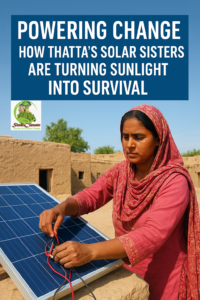 LAKSHA KUMARI
LAKSHA KUMARI
“Solar Sisters” of Thatta
In a small mud-walled village near Keti Bunder, 32-year-old Sakina unrolls a tangle of red and black wires beneath the blazing Thatta sun. A few years ago, she had never touched a tool — today, she installs solar panels that light up homes once plunged in darkness.
“Earlier, we waited for kerosene lamps,” she says, tightening a screw. “Now, my children study after sunset. I also earn enough to buy their books.”
Sakina is among dozens of women in coastal Thatta trained as community solar technicians under local initiatives supported by the Sindh Solar Energy Project and grassroots partners like HANDS. In a district where more than 30 percent of rural households still lack grid electricity, these women are changing what power means — both literally and socially.
Before solarization, most families relied on costly diesel generators or hazardous kerosene. Frequent cyclones and sea intrusion worsened energy poverty, forcing migration from several coastal villages. The new solar units, small but reliable, now power lights, fans, and mobile chargers — restoring not just comfort but dignity.
Yet the shift is not just technical. It is cultural.
“When I first started climbing rooftops to install panels, men laughed,” recalls Ayesha, another technician from Sujawal. “They said this work is for men. Now, when their own bulbs light up, they come to me for help.”
This quiet transformation hints at something larger: energy justice through gender inclusion. For the first time, women are not just beneficiaries of rural electrification — they are service providers. They earn between Rs. 5,000 and Rs. 10,000 per month, often through maintenance fees and household installations. Some are forming informal cooperatives to expand their reach.
Experts say such grassroots solar models could reshape Pakistan’s climate adaptation approach. “Women-led solar enterprises in off-grid Sindh represent scalable climate resilience,” says a renewable energy analyst from UNDP Pakistan. “They link clean energy access with livelihoods — the core of sustainable development.”
Still, challenges remain. Spare parts are hard to find, technical refreshers are rare, and many women face domestic resistance. “My husband didn’t allow me to travel to training at first,” admits Sakina. “Now, he helps carry the tools.”
The “Solar Sisters” of Thatta embody a subtle revolution — one bulb, one rooftop, one empowered woman at a time. Their story is a reminder that Pakistan’s energy future may not lie only in massive power plants, but in the steady hands of women transforming sunlight into survival.
